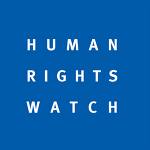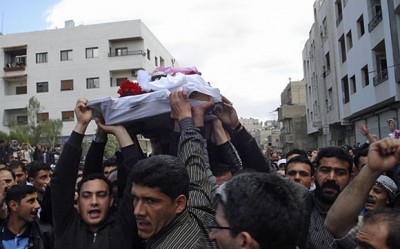 A major human rights organization took the unusual step Sunday of calling for international sanctions against Syrian officials in the killings of hundreds of peaceful protesters during weeks of antigovernment rallies.
A major human rights organization took the unusual step Sunday of calling for international sanctions against Syrian officials in the killings of hundreds of peaceful protesters during weeks of antigovernment rallies.
New York-based Human Rights Watch also called for an independent investigation into the killings by Syrian security forces after a weekend escalation in the government’s continuing crackdown against the nascent democracy movement.
Syrian human rights activists say plainclothes and uniformed security officers killed 120 people in two days, bringing the number of civilians killed in weeks of unrest to more than 300. On Sunday afternoon, there were reports of renewed gunfire and at least nine people being killed in the coastal city of Jableh, according to the news channel Al Jazeera and witnesses.
Meanwhile, activists reported hundreds of people missing and thought to be in detention, as well as midnight raids Saturday on homes in several suburbs of Damascus, the capital, and in cities across the nation.
“All the areas around Damascus have been surrounded,” said an activist reached by telephone. “If two people are in a car, they search the whole car. You have to show identification just to get in and out.”
The arrests and searches have taken place, activists say, despite the lifting Thursday of a decades-old emergency law curtailing civil liberties, a move by the government to mollify its critics at home and abroad.

The U.S. currently restricts trade with Syria over its alleged support for militant groups and interference in neighboring Lebanon, rather than human rights violations.
Nadim Houry, a Beirut researcher who monitors Syria for Human Rights Watch, said international efforts until now had had no effect on the Assad government.
“We’ve seen all these condemnations from the European Union and the U.S., but the problem with these condemnations is they are not having any impact on the behavior of the security forces,” Houry said. “It is important for the international community to send a clear signal to authorities ordering protesters to be shot that the world is watching and will back up these statements with sanctions and travel bans.”
Houry suggested sanctions that would ban travel for Syrian officials found to have ordered rights violations and freezing any assets they have abroad.
Security forces fired on protesters in 14 towns and cities across the country over the weekend, according to Houry.
The crackdown continued Sunday despite small signs of cracks within the ruling elite, including the resignation of more government officials in the restive southern city of Dara. At least seven officials had resigned as of Sunday afternoon, including two members of parliament, a state-appointed cleric, the head of the Islamic endowments in Dara and several local councilmen.
Meanwhile, the Syrian Cabinet also approved laws reducing interest on home loans, providing electricity to water-well pumps and expanding subsidies and food packages to those affected by an ongoing drought, the official Syrian Arab News Agency reported.
A witness in Zabadani, outside Damascus, said security forces had surrounded the town, where several hundred residents were holding a sit-in at a central square they had renamed “Martyrs Square” and demanding the release of about 100 missing people believed to be in state custody.
“We are asking for our rights,” said the witness, who was reached by telephone. “We are asking for freedom and change. The ruler cannot oppress his people like this.”
Funerals were held in towns and cities around the country. A large funeral for four people was held in Duma, a suburb of Damascus, without incident Sunday though security forces had surrounded the area and cut off phone service since Saturday, a witness said.
State media have blamed anonymous “armed groups” and foreign infiltrators for much of the recent violence, focusing on the alleged targeting of police and security forces. State news reported Sunday that seven security personnel were killed when gunmen attacked a checkpoint outside Dara. LAT

Leave a Reply
You must be logged in to post a comment.